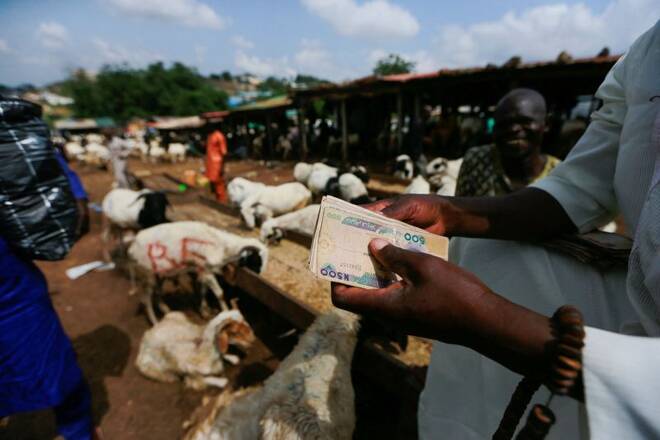Advertisement
Advertisement
Nigerian court suspends Friday deadline to swap banknotes
By:
By Camillus Eboh and Chijioke Ohuocha ABUJA (Reuters) - Nigeria's Supreme Court on Wednesday prevented the government from enforcing a Friday deadline for citizens to swap old banknotes for new ones, as the International Monetary Fund flagged disruptions to trade and payments.
By Camillus Eboh and Chijioke Ohuocha
ABUJA (Reuters) – Nigeria’s Supreme Court on Wednesday prevented the government from enforcing a Friday deadline for citizens to swap old banknotes for new ones, as the International Monetary Fund flagged disruptions to trade and payments.
Nigerians were due to turn in old 1,000, 500 and 200 naira banknotes in exchange for newly designed notes by Friday as part of a central bank initiative to curb cash in circulation and control double-digit inflation.
The plan has caused huge controversy, with people saying there are not yet enough new notes available, leading to chaotic scenes at banks and acute cash shortages.
Some politicians have criticised the timing ahead of Feb. 25 elections for a new president and lawmakers, as campaigns are funded by mostly hard to trace cash.
Supreme Court Judge John Inyang Okoro said the decision to suspend the deadline was unanimous, pending a legal challenge from three states who had argued that the note swap plan was causing hardship ahead of the elections.
The court is due to hear the states’ challenge on Feb. 15.
Earlier on Wednesday, the IMF’s resident representative in Nigeria urged the Central Bank of Nigeria (CBN) to consider extending the deadline for notes to be swapped given disruption caused by the shortage of new notes.
The central bank says the plan also aims to reduce fraud as the security features on the new notes will make them harder to counterfeit and that it will foster a move towards a cashless economy.
About 1.3 trillion naira ($2.8 billion) in old notes has been deposited into the bank since the announcement in October, according to the bank.
Some ruling party officials have publicly accused the CBN of a plot to turn voters against its candidate in the presidential election, Bola Tinubu.
President Muhammadu Buhari is not running he will complete his constitutionally allowed two terms in May.
Inflation and a flagging economy are likely to be major issues for voters at the elections, with many saying life is harder than when Buhari took office in 2015.
($1 = 459.92 naira)
(Reporting by Camillus Eboh; Writing by Chijioke Ohuocha; Editing by Alexander Winning, Sharon Singleton and Chizu Nomiyama)
About the Author
Reuterscontributor
Reuters, the news and media division of Thomson Reuters, is the world’s largest international multimedia news provider reaching more than one billion people every day. Reuters provides trusted business, financial, national, and international news to professionals via Thomson Reuters desktops, the world's media organizations, and directly to consumers at Reuters.com and via Reuters TV. Learn more about Thomson Reuters products:
Latest news and analysis
Advertisement
